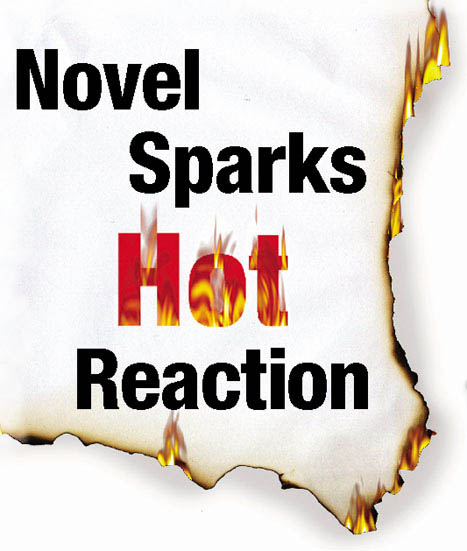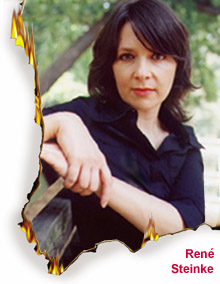

|
Professor
|

Since publication of René Steinke’s first novel, The Fires, reviewers have praised her in glowing terms. She’s “incapable of writing a bad sentence,” wrote one. Another called her an “astonishing writer” who has produced a “deliciously dark” and “gorgeous” piece of art. With her second novel about to be finished, Steinke’s writing career, aflame with an artistic combination of powerful prose and poetic imagery, is burning brightly. The associate professor of English also teaches a wide range of fiction and poetry courses at the College at Florham in Madison, while serving as editor-in-chief of the internationally renowned journal The Literary Review. Her writing in particular, she says, pays great dividends in the classroom. “If you’re giving students advice about constructing scenes and writing beautiful sentences, it helps to be writing yourself,” she explains. “That’s my research and one of the ways I prepare for class. You need to be up on your game.” Steinke is definitely on her game, and others are taking note. The Fires, published in 1999 by William Morrow (the paperback was published by HarperPerennial), was selected as one of the best books of the year by The Austin Chronicle, and the film rights were optioned by Madonna’s production company in partnership with Handprint Entertainment. The screenplay is done, and a director is interested in the project. Sizzling Debut
The Fires is a dark and haunting tale of Ella, a young woman from a small town who was terribly scarred as a child by a fire. Her family is “claustrophobically secretive,” as Steinke puts it, and won’t discuss the fire nor much of anything else that matters. Ella is promiscuous and is driven to set fires, Steinke says, “partially because of the silence and repression in her family and partially because she needs to uncover the secrets buried in herself.” Steinke got the idea for the book while she was a student at Valparaiso University in Indiana. “I learned about a sort of legendary fire on campus in the administration building,” she says. “It was a case of arson but the identity of the arsonist was a mystery. I invented Ella because I wondered about that fire.” Steinke adds that she had imagined the Midwest as a place where people were always well-behaved and things were a little boring. “But after I lived there, I began to notice strange characters, and I sometimes sensed a malevolent undertow that I wanted to capture.” In The Fires, Steinke isn’t trying to deliver one explicit message. “I was really interested in exploring the themes of repression and female anger. The story unfolds from there.” For research, she studied cases of pyromania and learned as much as she could about fire. “I wanted to tap into the universal fascination with it; its visual and mythic power. I looked for fire in poems, paintings, scenes in novels, myths; I watched the movie Backdraft about five times.” Ironically, Steinke is afraid of fire and says she even has trouble starting the pilot light on a stove. Her second novel is based on a historical figure and is set in Greenwich Village in the early part of the 20th century. Titled Holy Skirts, the book delves into the life of German Baroness Elsa von Freytag-Loringhoven, a Dada sculptor and poet who was known for her flamboyant lifestyle. “She is like Ella in the sense that both are extreme personality types. They commit outrageous acts, but my take is to explore their inner lives and engage the reader’s empathy.” To help capture the flavor of New York City at the turn of the century, Steinke read everything she could about the period. “It was a crazy time, and I’ve tried to accurately depict the atmosphere.” After spending seven years on The Fires, Steinke worked nearly exclusively on Holy Skirts for three years. Writers are consumed by rewrites, she says, “but at some point you have to let go. I subscribe to the notion that novels aren’t finished, they are abandoned.” She compares her creative process to that of a sculptor. “Writing is like putting on some clay and then taking some off. It’s a constant process of seeing how the form is going to emerge.” Early Epiphany
René Steinke knew she wanted to be a writer since she was a young girl growing up in Friendswood, Texas (near Houston). Her father was a Lutheran minister who would weekly write out his sermons. Steinke was struck by the impact of his words on the congregation. “I saw how words mattered, and that caused me to want to write.” After graduating from Valparaiso University, she earned her master of fine arts in creative writing from the University of Virginia and her PhD in English from the University of Wisconsin-Milwaukee. Driven by a desire to live in New York City, Steinke began teaching at City University of New York, Queensborough Community College in Bayside in 1995, while starting to build her writing career. Her poetry and stories have appeared in various publications, and recent credits include an essay on J.D. Salinger for the book With Love and Squalor, an essay for a book called Dog Culture and a piece on the Baroness in a special edition of The New York Times Magazine. She also has received an Academy of American Poets prize and three PSC-CUNY Research Foundation awards in creative writing. Steinke says that while she began writing seriously as a poet, she today considers herself a novelist. But her prose is interspersed with poetic sections. For example, in The Fires she weaves throughout the text dream-like meditations on fire that reveal a more concealed side of Ella’s psyche. She adds that the novelists she admires most have a “kind of poetic sensibility in their use of language.” She lists among her favorites Virginia Woolf, Michael Ondaatje (author of The English Patient) and Vladimir Nabokov (Lolita). The Tradition GrowsIn 2000, Steinke joined the faculty at Fairleigh Dickinson University, where she teaches courses like Fiction Writing, Poetry Writing and Advanced Writing Workshop. She also is teaching in the University’s new master of fine arts program in creative writing, which features low residency requirements, an international focus and international readers. “I’m very excited about this program,” she says. Although there are certain things about writing that cannot be taught, Steinke says all students can learn how to construct sentences skillfully, how to effectively use language and how to move stories forward. The key, she says, is to write a lot and read a lot. “Some students say they want to be original and not read other writers. But there’s no way to be completely original. If you’re writing, you’re already part of a tradition.” Steinke became part of another tradition when she joined the University’s acclaimed creative writing journal, The Literary Review. Established in 1957 and published quarterly, The Literary Review regularly devotes entire issues to contemporary writing from specific nations, cultures and languages. After starting as senior editor, Steinke was appointed editor-in-chief this year, succeeding Walter Cummins, editor emeritus and professor emeritus of English, who held the position since 1984. As editor-in-chief, she oversees all aspects of production from soliciting contributions to selecting the cover design to deciding what goes on the publication’s Web site (www.theliteraryreview.org). “It’s a tremendous amount of work,” she says. “We receive about 200 to 300 submissions every month, and I have to read just about everything.” In selecting submissions, Steinke looks for a “distinct and fresh voice, something that feels honest and new.” For Steinke, the most gratifying part of working on The Literary Review is “giving writers an opportunity to be read” and “working with colleagues like Walter Cummins, who has been a wonderful mentor.” Focused on the FutureWhile writing, teaching and editing consume much of her time, Steinke occasionally trades words for notes. She is a keyboardist with a punk rock band in New York City. The group, Ruffian, includes her cousin, who is also a novelist, and two other writers. Steinke shares her enthusiasm for music and editing with her husband, Craig Marks, who is the editor of the music magazine Blender. The Brooklyn resident also is a recreational jogger who hits the pavement running nearly every day. Although Steinke has already achieved much, she’s not spending time reflecting. While wrapping up her second novel, she says her head is percolating with ideas for a third. She plans on setting her story in Texas, where she grew up. She also is already thinking about The Literary Review’s 50th anniversary celebration in 2007. And, she’s looking forward to the introduction of a creative writing undergraduate major at FDU. Of course, having her books sell like hot cakes or seeing The Fires in theaters across the country would be nice too, but Steinke doesn’t dwell on such matters. “It’s not that I’m not ambitious, but if you get too caught up in material issues and things you can’t control you will get distracted from the task at hand.” That focus is not unexpected from a writer lauded for “her singular angle of vision.” And so her writings and teachings will continue to be ignited by passion and ablaze with uncommon talents. And readers and students have plenty to look forward to. |
|
FDU Magazine Directory | Table of Contents | FDU Home Page | Alumni Home Page | Comments |
|